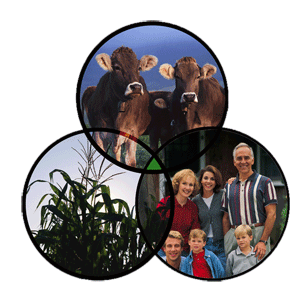SAN ANTONIO – August 8, 2016 — Envision our world as three circles representing people, animals, and the environment. At the moment, these separate shapes only slightly overlap and share a small, happy space nicknamed the“Ray of Hope for the Future.” That ray of hope is One Health—a growing movement that envisions a path to planetary health through One Health education and collaborations. With an excited leader at its helm, the One Health Commission is poised to encourage the merging of those three circles into one unified, healthy world.
“Collaborations don’t just magically happen; they start with relationships,” said Dr. Cheryl Stroud, Executive Director of the One Health Commission (OHC). “And relationships don’t just magically develop. They start when we come together in direct conversations. This rarely happens in today’s systems of silos.” Dr. Stroud’s James H. Steele One Health Presentation Monday, August 8, from 5:00 PM – 5:50 PM is one of many sessions about all the faces of One Health during the American Veterinary Medical Association (AVMA) Annual Convention, August 5-9, in San Antonio.
 Just what is One Health? It is an international conversation among multiple health science professions that is working to provide optimal health and well-being for virtually every organism and its environment on this planet. That is a tall order, but it’s not an impossible one to fill.
Just what is One Health? It is an international conversation among multiple health science professions that is working to provide optimal health and well-being for virtually every organism and its environment on this planet. That is a tall order, but it’s not an impossible one to fill.
“One Health is actually an old concept about different disciplines in environmental, human and animal health working together to address today’s‘wicked’ problems like unsustainable food supplies, emerging infectious diseases, antimicrobial resistance and climate change,” Dr. Stroud says. “But, with ever-increasing technology and health professionals becoming more and more specialized, collaborations across the disciplines got lost along the way.” The puzzle pieces began finding each other once again in the early 2000s when the One Health concept emerged.
The One Health Commission was formed in 2009 as a result of a year-long One Health Initiative Task Force partnership between the AVMA and the American Medical Association. Dr. Stroud was appointed Executive Director in 2013.“The Commission operates under the slogan ‘Connect. Create. Educate.’” said Dr. Stroud, “and works to enhance collaborations among professionals—from anthropological and environmental to horticultural experts, physicians, public and global health workers, and veterinarians—to increase our connectivity to each other.”
The Commission has joined forces with two leading international groups, the One Health Initiative and One Health Platform, to create an annual global One Health Day. Celebrated for the first time on November 3 this year, many of One Health’s advocate organizations and individuals around the world will be participating in the inaugural event, from students to established professionals in academic, corporate and non-profit arenas. They will be showcasing One Health projects and special events that can lead to sustaining biodiversity, protecting the planet and saving millions of lives.
Among the Commission’s other efforts are promoting One Health education and awareness about bat rabies to school-aged children, supporting educational webinars on difficult topics such as antimicrobial resistance and emerging diseases like human Bartonellosis, and preparing the next generation of One Health leaders by supporting Students for One Health.
The 2016 AVMA convention will feature a plethora of One Health topics, including discussions on Ebola virus and other zoonotic infectious diseases, One Health and disaster preparedness, food security, and global health. “I’m very excited to see so many One Health presentations planned for this year’s AVMA convention” said Dr. Stroud.
She will be speaking about global efforts for One Health and will provide convention attendees with a sneak peak of the Smithsonian Institute exhibit “Zoonoses and One Health” that will be unveiled in Washington, D.C. in 2018. “The Smithsonian Institute totally understands the importance of One Health and how it relates to emerging zoonotic diseases such as Ebola, SARS, and Zika, to name a few,” said Dr. Stroud. After its initial stint at the Museum of Natural History, the traveling exhibit will education the public across the U.S. and, eventually, internationally.
There is virtually no down time for Dr. Stroud and the Commission. The OHC agenda is filled with events like hosting a Second International Who’s Who in One Health webinar on November 4 in conjunction with One Health Day, planning a One Health: Land, Sea, Air Conference in March 2017 at the Georgia Aquarium and following Senate Bill 2634, which proposes establishment of a federal interagency One Health Program.
Of course, building One Health awareness remains the underlying priority, and the OHC Director has personal evidence of success. “I was thrilled recently to speak about One Health at a recent National Institutes of Environmental Health Sciences meeting in North Carolina,” said Dr. Stroud. “I asked for a show of hands in the room of about 100 participants from many professions and discovered that about 85% of the attendees were familiar with One Health. We are making progress.”
To learn more about the AVMA Annual Convention, visit www.avmaconvention.org. For more information on media opportunities at the AVMA Convention, and to register as a press attendee, contact Michael San Filippo, AVMA senior media relations specialist, at 847-285-6687 (office), 847-732-6194 (cell) or msanfilippo@avma.org. Members of the media must register with the AVMA prior to the convention to validate their press credentials and ensure that their press badges and materials are ready for them when they arrive. Registration for the press is free.
# # #

